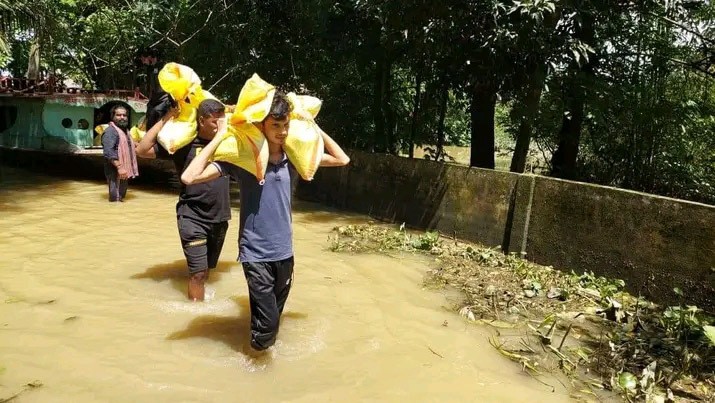Youth Providing Flood Relief in Remote Areas
Bangladesh is one of the countries most vulnerable to the effects of climate change. Young generations are the ones on the frontline to tackle the various crises.
By Jarraf Hamim, Climate Justice Activist, YouthNet for Climate Justice, Fairuse Akter Mou, Climate Justice Activist, YouthNet for Climate Justice. Written in collaboration with Simavi WAI WASH SDG Bangladesh Subprogramme Team
This year Bangladesh faced one of the most disastrous and record breaking floods and water crises. As the country is the seventh most vulnerable country due to the adverse effects of climate change, these extreme climatic events are happening more and commonly affecting the young generations and their future. Yet they are the ones working in the frontline to tackle the crises.
Flooding and lack of drinking water
“It is so difficult for the youth volunteers to reach the flood affected people. Boats are the only transport system but the number of boats is not sufficient. The volunteers are unable to collect enough funds to resolve this problem. Besides, with the price hike, people are not even able to buy the bare minimum. Thus, more relief is required. And there is also a crisis of clean, drinkable water.”
The situation was echoed by one of the climate activists Nazmun Nahid from YouthNet for Climate Justice, Bangladesh. He is painstakingly working in the remotest places such as Osmani Nagar, Bishwamvarpur, Tahirpur of Sylhet to provide relief during the flooding. He and his team are also reaching isolated communities in Kurigram and Sunamganj.

Impacted by the climate crisis from an early age
The flood crisis is not a new phenomenon in Bangladesh as it is situated on the Brahmaputra River Delta. The country is also less than fivemeters above the average sea level. Hence, heavy rainfall within a short period of time results in floods. However, due to climate change such erratic rainfall and water coming from nearby hills are increasing day by day. Consequently, people are seeing an increase in the salinity level, contamination of water, water scarcity and losing their lands to flooding or riverbank erosion.
Among the age groups, young people are impacted by this climate crisis from an early age. Many waterborne diseases among children and youth are increasing. Inequality is rising as the girls are dropping out from schools to collect water from distant places. This is affecting both their education and health.
Young people are taking action
However, young people are more aware and vocal about their rights even in this dire situation. More and more grassroots organisations are forming being set up to address local environmental issues. Young people are taking their governments to court for failing to address climate change or protect nature for future generations.
"For instance, the Bangladesh government had planned to implement the second phase of the Matarbari coal-based power plant in Cox’s Bazar. Experts from the Centre for Research on Energy and Clean Air (CREA), a Finnish research organisation found that the project would pose severe threats to the environment and human health. Fortunately, the youth activists from the YouthNet for Climate Justice and Fridays for Future pledged the government to stop implementing the power plant and achieved victory."
On discussing the YouthNet team’s response to this year’s flood, Nahid said: “We are supplying dry foods, pure water, and oral saline to the flood affected people. Nearly 500 sanitary napkins were distributed, as well. We are also helping the affected people to reach safe shelter.
Currently, we are providing tin materials to build new houses and toilets based on their urgency for rehabilitation. We are also supporting the youth in their education and mental health.” Nearly 100 volunteers started working with Nahid since 16th June of this year and they have dispensed relief items to more than 5,000 families. They collaborated with organizations such as Volunteer Opportunities, Bangladesh Development Organization, Pashe Achi Initiative, Prottasha Foundation and Youth for Change BD.
This flood has shown that the actions of youth organizations and adaptive measures taken by the government are not enough to tackle the climate crisis. Mitigation should be our focus as well.
Nahid added that the government must allocate more budget to the environmental sector and implement policies that will be more eco-friendly. To reduce flood impact, sustainable water drainage systems, accurate roads and infrastructure should also be prioritised. But to understand and resolve the crisis from the root, creating a space for youth opinion is imperative.

